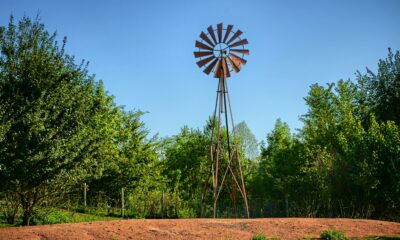Features
Ayetoro Town is Going Underwater But Help May Be On its Way
In Ayetoro, people built fancy beach houses, and the town was prominent for the building of poles and tourism.
Ayetoro, where Anthony was born and raised, is going underwater; a far cry from the town he knew growing up.
Anthony lived everybody’s childhood dream. The sea was about 1 kilometre from his house, he and his friends played on the seashore, and he watched people go to the sea to fish for crayfish and different kinds of fish. “In Ayetoro, in those days,” he says, “chicken or meat was like imported food to us because everything we grew up around was fish. People built fancy (kinda) beach houses, and the town was prominent for the building of poles and tourism. There are photos we could use to compare how the town was and how it is now.”


People fished, children played; it was a beautiful life.
Soon, Anthony began to see what he described as fascinating light: fire in the middle of the sea. “I remember that at night, we would see fire from the distance in the sea and ask our parents, “What is that fire?” As children, we wished to be there to see what caused the fire in the sea.”
And that is where this story begins.

Religious procession on the seashore by people who are mostly white garment-wearing. The house in this photograph belonged to Anthony’s late uncle, Titus Aseluwa. It was one of the closest houses to the shores and was destroyed in 2018.

This image shows the distance between the shore and the houses in the background. This land is mostly dry in the dry season for kids to play on.
Founded in 1947 by The Apostolic missionaries led by the late Zaccheus Okenla, Ayetoro is situated along the Atlantic coast in Ondo State’s Southern region. Tribune says of Ayetoro Town and its people: “They were reputed for their commercial living and advanced technology in fishing, transportation, industry such as carpentry and furniture, shoe making, bakery, soap making, textile and marine business. The town was said to be so popular that it attracted the attention of Chief Obafemi Awolowo and the communist world in the 1950s, particularly the Union of Soviet Socialist Republics (USSR). Many students from Ayetoro were educated through a bilateral agreement with countries like West Germany, Hungary, Austria and the United Kingdom.”
By the 1990s, climate change began to affect Ayetoro Town. Anthony says, “The sea started to get closer. Gradually, the one-kilometre distance between the people and the sea began to close up. And at a time, it just closed up. The people and the government started to notice the problem.” He remembers the fire in the middle of the sea – “oil exploration,” he says and attributes it to one of the causes of climate change in Ayetoro (oil firms have since denied culpability). For the residents of Ayetoro, oil spillage soon made it difficult for them to fish, and due to climate change, the sea began to close in on their homes.
Today, nearly 2,000 people have been displaced and 200 homes have gone underwater, one of which is Anthony’s family home.
This is my hometown. My father’s house is already under the sea and you can’t see it in this video.
This is what decades of oil exploration by multinational companies and the negligence of Nigerian government has done to my people and the people of the Niger Delta region. https://t.co/KwqiDVwMpA
— Groovy (@avogroovy) April 19, 2023

A street view of Ayetoro

A football pitch on the seashore

A football match being kicked off by the king at the seashore in the early ’70s
Anthony had three homes in Ayetoro growing up – his father’s home, his mother’s home and the palace. A long road parts Ayetoro into two. His father’s house was on one side and his mother’s on the other. It is his father’s part of Ayetoro Town that has been submerged in water.
“My dad was the king of Ayetoro 20-something years ago. Of course, when you become a king, you leave your house to live in the palace. So the house where we grew up was the one that has been totally destroyed now. My mother also owns a home in Ayetoro.
Last week, we started evacuating properties from that house too because when a part is gone, the other side would be attacked soon. There are also business owners who have basically moved out. I don’t know where they relocated to or if they’ve stopped selling. For us, we have two houses, my mum is also from Edo so that has always been our second home. But a lot of people don’t have that kind of option. I was speaking with my brother yesterday and he said my uncle’s house is next. For someone like him who doesn’t have a house in the city or anywhere else, what will be his fate?”

In the past, efforts were made to salvage the situation. Anthony says that “The Niger Delta Development Commission intervened. They instituted the Ayetoro Shore Protection Project. At the time, the project was 2.5 billion Naira, contracted to a company called Gallet Nigeria Limited. They did mobilise to the site and people were happy that there was an intervention. But, suddenly, they left their equipment and we never heard from them again.
After that, the representatives from the region took two people from Ayetoro to the Netherlands to conduct a study because they had a similar problem in the Netherlands. They took soil samples from the two places and studied how they solved their problem. That definitely led to more progress. So the same contract that was awarded in 2002 was rewarded again in 2009 to Dredging Atlantic Nigeria Limited. It was awarded 6.5 billion Naira. We heard the company was paid one-third of the initial sum of the project. They also did mobilise to the site. Actually, they did intensify the problem. When they came, they started to dredge Ayetoro and the neighbouring towns to sand-fill the shore, however, they abandoned it and disappeared. The places they dredged were left open, and it made it easier for the sea to attack.”
To cushion the effect of residents’ homes going underwater and the displacement of people, Anthony says that “The government did come with roofing sheets, bed sheets, mosquito nets and rice to distribute to the affected people about four or five years ago.”

A kid and Kaye Barrett at the seashore
But in the midst of these, there is a silver lining. One of the recent moves is that the attention of the World Bank has been called to the situation. So, there’s a coalition of the World Bank, the Federal Government, and the Ondo State Government. “The last we know which was confirmed by the Ondo State Commissioner for Environment was that the Ondo State government has received some money from the World Bank as of last year. But now, we have not heard any move on the project. So it’s a vacuum right now,” Anthony says.

Women seen pushing a cart of fish home from the shores. The place is long submerged under the sea.

He also proffers some solutions: “The only thing Ayetoro people have been asking for in the last 30 years is for the sea embankment project to be done. We’re not asking the government for electricity or good road, or anything; we only need the sea embankment project to be done. When that’s done, that’s it. I don’t know what’s been agreed on but I know there are meetings to meet certain demands.”
To help cushion the impact of the floods, Anthony hopes to “help with relief materials and build primary shelters for people to move into, ‘while we still call on the government.'” You can also help the people of Ayetoro by providing shelter and relief materials through NGOs. The residents have been clamouring for quick action from the Ondo State Government, you can join in amplifying their voices and spread the word to get the World Bank properly involved – and swiftly too.
Beyond Ayetoro Town, flooding is a big issue in Nigeria. As we prepare for the rains, we also must remember we all have a role to play in mitigating its effects and helping displaced people. Pay attention to your environment, form daily environment-friendly habits and don’t litter the floor or throw your waste into the waterways. Above all, lend your voice to the plight of displaced citizens and continuously call on the government to take proactive climate actions.
***
All photos are gotten from Ayetoro Community Photo Archives. Feature image from Jordi Gamundi Domenech for Pexels.
Many thanks to Anthony Olasele for having this conversation with me.





















